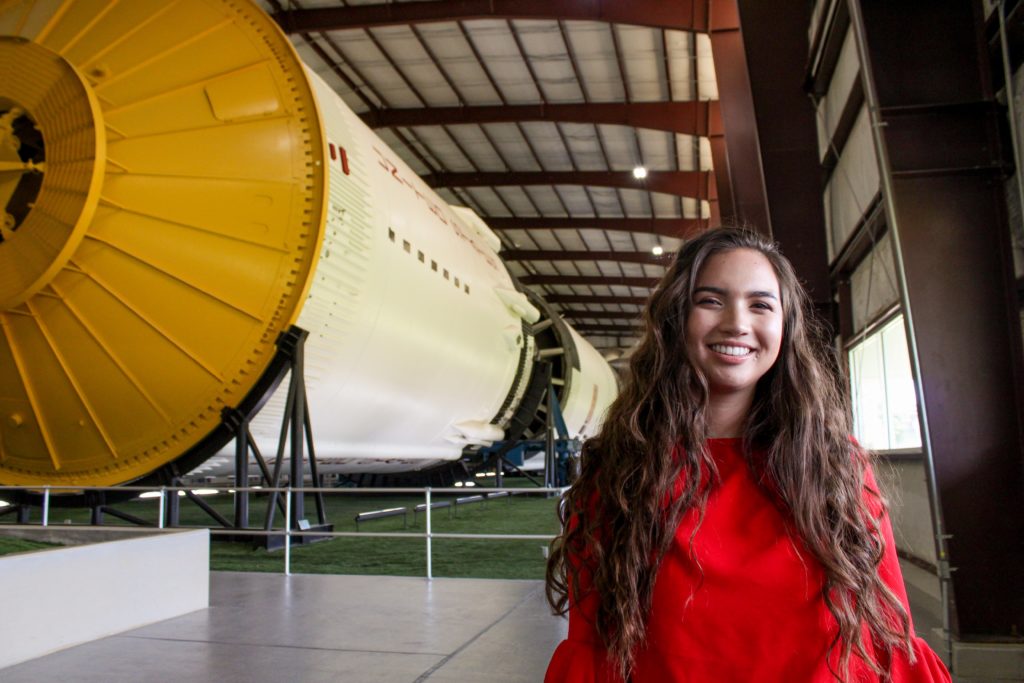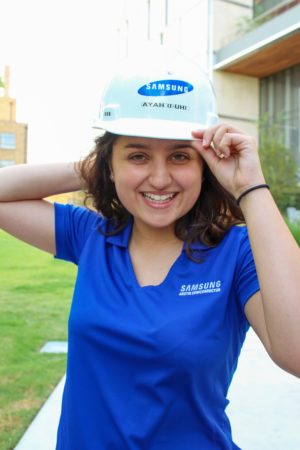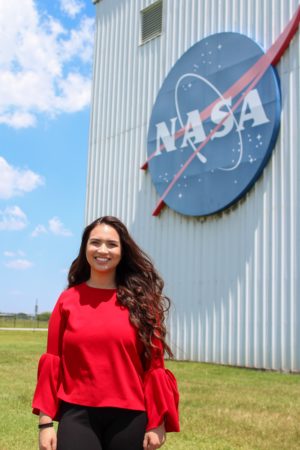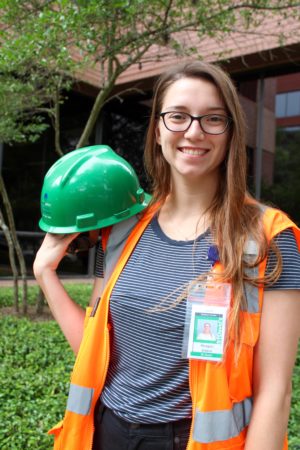Four women in engineering at The University of Texas offer a peek at what it’s like as a woman in science.
Story and photos by Kaiti Neuman

It’s no secret men have dominated STEM fields for centuries. However, women are finally becoming prominent figures in this realm. We talked to four female engineering students attending the University of Texas to get firsthand glimpses at the world behind the numbers, in both the classroom and in the workplace, and their thoughts about the future for science-minded women.
Ayah Alomari is a third-year civil-engineering student currently finishing work as a summer engineering intern at Samsung Austin Semiconductor on the scrubber team. Meagan Costey is a third-year civil-engineering student currently working for a leading general contractor in Austin, doing project-engineer work on an active job site. Jessica Pronga is a third-year aerospace-engineering student who’s contracted through a company called CACI and is currently finishing up work as a software-engineering intern at NASA’s Johnson Space Center in Houston, working on the simulation and graphics team for the Orion Ascent Abort-2 project. Hannah Rens is a third-year aerospace-engineering student finishing work as part of a proposal team responding to a NASA research announcement and has spent the summer working as a systems-engineering intern for Boeing.

Austin Woman: How did you become interested in math and science?
Ayah Alomari: I had the fortunate ability to grow up with a math and science dad. My dad was a physicist and so, my whole life, he really pointed things out growing up to me and my siblings, so my siblings and I were all math people. … Going into that growing up and being in math classes and being in science classes, I always wanted to learn more. I always really actually enjoyed applying those theorems, those techniques to real-life situations, and the best way to do that was to pursue engineering, and that’s what led me here.
Meagan Costey: I don’t think there was ever another option for me. My sister was really creative, and I wasn’t like my sister at all, so, I thought, “Oh, I guess I’ll do math and science.”
Jessica Pronga: Well, both of my parents are electrical engineers, so that sort of mindset had always been pushed on me ever since I was little, and I strongly, strongly rejected it when I was younger. … I always did like math. … It wasn’t until my junior year of high school when I took physics—because it combined science and math—that everything kind of clicked and I really, really enjoyed it.
Hannah Rens: Well, I never really felt good at math. … I distinctly remember in second grade crying over multiplication, and it was super-embarrassing and I hated my life. Then, in sixth grade, somehow I got put in the accelerated program. … Then, from there it was just kind of an assumed thing, but I never felt comfortable [with math]and I still don’t. And then, science-wise, I don’t know, it always just seemed very common sense to me. I grew up with two engineers in the household, so that probably had something to do with it.
AW: As a woman in STEM, do you feel your peers and professors take you seriously?
AA: I’ve actually had the fortunate opportunity to always be respected by my professors, even though the majority are male. I’ve only really had one civil-engineering female professor, and I’ve always been respected by my classmates. … I think it’s just subconscious stereotypes that make people say things that they don’t really mean, but what’s really important is that we, as women engineers, call attention to those and question those so they see that, “Oh crap, I didn’t mean it that way!”
MC: There have been very few times where I haven’t felt taken seriously. It’s mostly just by peers, but I think it’s more like a boys-are-immature thing and less of a I’m-a-girl-so-they-don’t-want-to-listen-to-me thing.

AW: Do you feel respected in your STEM work experiences?
AA: I do feel respected by my team, and my team is always willing to help me when I need it. My projects are equal to my level of expertise and technical abilities. I never felt like my projects were less than that because I’m a female. There’s another male intern. We’re both on the same team. I’ve always felt equally treated to him and never really treated any differently. And even sometimes that male intern will be talking about our project or what not, and he’ll talk over me. … And the mentors that I have will be like, “Dude, she’s talking,” or “Let her talk.” … I think a lot of people don’t realize they’re doing it when they do it, but they do. … So, it was really awesome that people I’ve worked with have called it out and really support me.
MC: The project team I work with is really awesome. Everyone is very respectful. It’s just me and…my direct boss. She’s a project engineer…and she graduated from UT a year ago, and she was the first female engineer they hired at this branch. It’s cool working for her because she gets that it can sometimes be difficult to be the only girl in the trailer, the only girl on-site. … I never feel like I’m not respected because I’m a girl. But I do feel like it’s more difficult for me to get stuff done because if I’m too nice…people won’t give me the information or do what I need them to do by whatever date I give them, but if I’m too rude, they’ll just say that I’m bossy or…something like that. I could say the exact same thing as one of my dude co-workers and they would be calling him a good leader or strong, and I would definitely be considered rude.
JP: Everyone there is super-nice. … My mentor…provided a very good environment where I don’t feel scared to ask questions, and I don’t feel like I’m being dumb when I’m asking him a question. I think that’s a super-important thing, especially for any intern…and they’ve definitely made it really easy to do that.
AW: Have you ever received any disrespectful comments at work?
AA: One time, we were in a conference room and we had a meeting going on. One of our co-workers wanted to make a joke, so they said, “Hey, are there any women in the room?” And there was me and another intern, and we were the only females. He was like, “I want you to close your ears. I want to say something real quick.” I said, “No, I’m OK with hearing it.” … The fact that you needed to have women close their ears should have called attention that maybe you shouldn’t have to say it. … Or maybe you think that it’s offensive, and so you shouldn’t say it! It was a lot of little things. … It was just kind of strange to see and experience.
MC: At first, I was like, “Aw, they all say hi to me. That’s so nice. They’ll just chat with me and they’ll really open up about what they’re doing and stuff,” but just this week, our station guy was like, “Oh, you should hear the stuff they say about you, blah blah blah,” and I was like, “Oh. That’s gross.” I guess it’s to be expected, unfortunately.
HR: I was talking with a younger man in the industry, and I was under the impression it was a totally professional conversation, just like networking and learning about what the other does and everything like that, and then it was quickly turned into a romantic conversation that I was not anticipating. … That was definitely one of the weirder experiences. I’ve had older guys talk to me about, like, making sure I plan to start a family, and I’m like, “Would you be having this conversation if I was a guy standing in front of you right now?” … Well, the romantic thing was kind of an in-your-face big deal, but usually, it’s just little side comments like that.

AW: Are there a lot of other women in your STEM workplace?
AA: I actually expected more. I was surprised. The department I work in is called PCS. It’s called pumps, chillers and scrubbers. That’s what it stands for. Out of…15-ish engineers…one of them is female. And they recently hired her while I was there, so she’s a new hire. They used to not have a female for like, five, six years. … There’s not a lot at Samsung, I’ll be honest, and most women who are, they’ll be located in HR, or not engineering at all. I’m not sure percentage-wise how many they have. … I know out of the interns—we have 100 of them—about 30 percent are female.
JP: This year, I think it’s about half or at least a third girls [among the interns hired], which, to me, feels like there’s a majority of girls. … That’s the way you view things when there’s more than, like, 10 percent of girls. You’re like, “Oh my God, there’s so many of them!” … I think out of 20 [interns], there were seven to nine girls that are working through CACI. … There’s not enough girls. … Especially among the adults, there’s definitely a big gap. … NASA as a whole still has a lot of work to do, but CACI did really, really well this year [hiring more women].
HR: It’s about what I expected. My manager made sure that my mentor was a female at work, and that’s really nice, and there’s a lot of female leadership at our location, but as far as the other engineers I deal with day to day, they’re all guys, which, I mean, isn’t different than school at all. At this point, it doesn’t really faze me, but there are a lot of times where I look around and I’m like, “Oh, I am the only woman in this room.”
AW: Based on your experiences, how do you feel about the future for women in STEM?
AA: I attended this really awesome lecture at the Society of Women Engineers conference back in 2017. … What was really interesting that this woman said at this conference was that we are growing in that field tremendously, but we are forgetting about the females in college who are already pursuing engineering. … I think that’s where we’re falling through, but other than that, the young STEM K-12 outreach has grown. It’s on the up and up, so women are entering with a lot of STEM degrees but aren’t leavingwith a lot of STEM degrees. I think the next big step for the United States of America, or just women in general globally pursuing STEM, is to try to retain them once they’re in college and make sure they have a great network of people and make sure they feel confident enough to succeed and know that they are strong enough and can qualify, for sure.
MC: I think we’re finally starting to get enough women in powerful positions in these STEM organizations that people are finally starting to see that, “Oh, women have valuable opinions and are a valued part of our team and we need to get more of them on here.” … But I think even more than that, just starting at a younger age, getting more women intoSTEM [is important], like, having more outreach programs for giant companies like GE and Samsung and stuff like that. … They could easily have a family open day or something like that and younger kids could come tour their site. That [exposure]’s really important in child development and kids knowing that there’s not a gender gap. We can easily do whatever we want to do.
JP: I think it’s looking better for the future. … I think as that starts to grow and the culture around things starts to change—and it definitely is now—I think we’re going to see a big improvement, especially with all the cool missions to come, like we’re going to go to Mars…and there’s going to be a lot of amazing people. But hopefully, a lot of amazing women…are going to be a part of that.
HR: I think within tech, there are bubbles that are really, really good and really, really bad, but as a whole, I think we have made so much progress, especially in the last 30 years, that looking back to my original woman of inspiration [Anita Gale], looking back at her experiences, like she wouldn’t recognize what colleges look like today, as far as women’s enrollment and everything like that, but there’s still the limiting factors. … If you are a woman now and you are hellbent on succeeding, then you absolutely will, and you will probably be very happy doing it, but I don’t know if every little girl grows up feeling that they cando it, and that’s the next biggest challenge.

AW: What advice would you give to young girls wanting to pursue STEM?
AA: What you really need to do is not compare yourself to others but compare yourself to yourself and see the improvement that you make with yourself. Set goals for yourself. … Have a good idea in mind and always know that you’re good enough and that you shouldn’t compare yourself to others, and make sure you know what youwant, and not what others want or what others make you think you want. … In summary, one, don’t compare yourself. Two, plan for the future. And three, know that you’re good enough.
MC: Do it. … There’s nothing holding you back from doing it; it’s going to be difficult for everybody. No one’s going to just breeze through it. There’s no point in not trying just because you think it’s going to be too hard.
JP: Don’t be afraid to ask questions. If you don’t understand something, look into it more. Be inquisitive. Try to figure a lot of things out. Don’t think that because you’re not good at something immediately or you don’t see other people who look like you or seem like you in a group that you don’t have a place there.
HR: Being able to talk to any woman in any STEM field, just having some role model that is doing some cool STEM work—[it]doesn’t matter if it’s medicine or if it’s math or if it’s engineering or coding or anything—just having somebody in the industry who you can say, “I know that person,” makes it so much more personal and so much more real.


